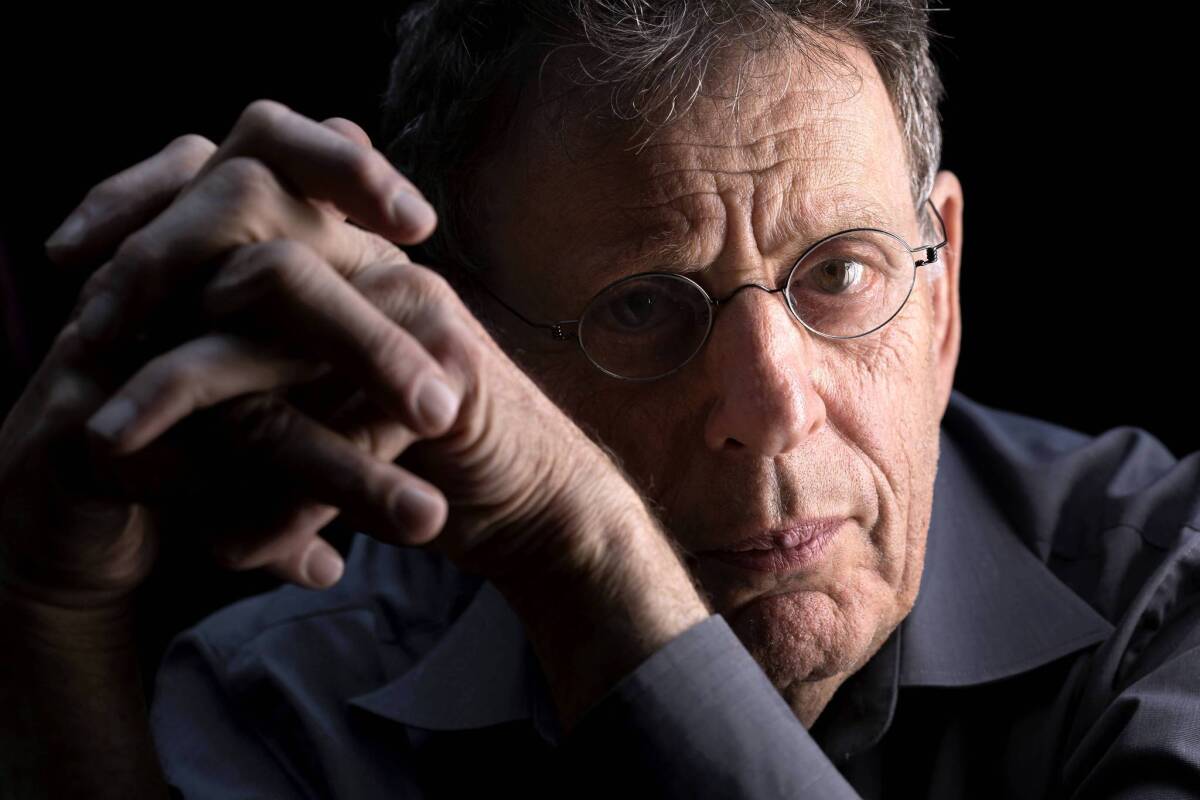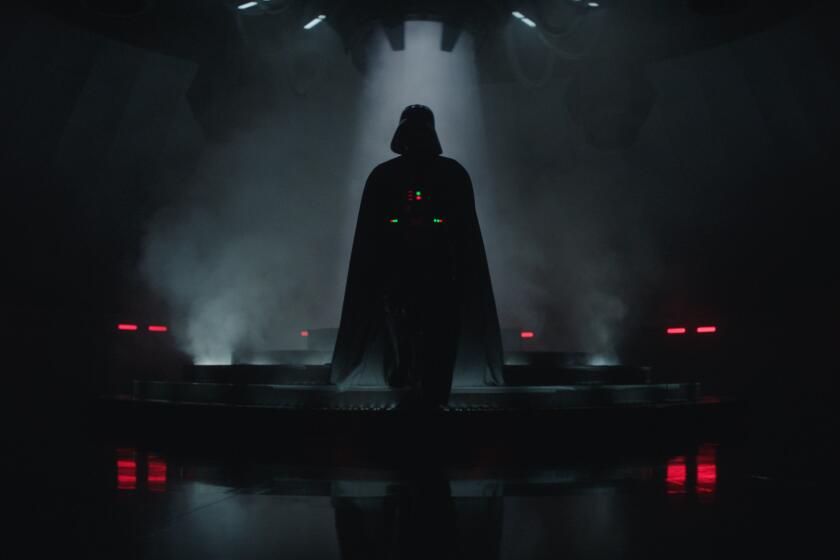Philip Glass’ ‘Einstein’ is opera because ‘that’s where the stuff was’

- Share via
NEW YORK — What opera launched a legendarily prolific opera career, influenced a generation of opera composers and is an American opera classic, yet is not an opera and has only been mounted a handful of times in the 37 years since its premiere? That’s an easy riddle. It’s “Einstein on the Beach,” which Los Angeles Opera will present next weekend at the Dorothy Chandler Pavilion.
“No, of course not,” Philip Glass answers when I asked whether he and director and visual artist Robert Wilson set out to write an opera nearly 40 years ago, both then part of a small community of SoHo avant-garde artists scraping by. Glass himself is now the world’s best-known classical composer, but he has remained true to those New York downtown artistic roots.
We’re talking in the now arty East Village, where the energetic 76-year-old composer lives and works in a brownstone he bought years ago when the neighborhood was still fairly iffy and which has much evidence of his two young sons.
PHOTOS: Operas by Philip Glass
“Bob called ‘Einstein’ an opera,” Glass explains. “He liked stirring up people. But we wanted to do a proscenium piece, and we needed an orchestra pit. We needed fly space. We needed people who could sing. We needed people who could dance. You could call it anything you want to, but the only place we could do it was in an opera house. That’s where the stuff was.”
Plus at the time, Local 802, the New York musicians union, operated on the dictum that operas play in opera houses. Call it something different and the union could shut down the show.
“Stuff,” in the sense of the relativistic weirdness of matter, is also what “Einstein” essentially is about. Just as Albert Einstein helped illuminate the nature of light, which is simultaneously particle and wave, “Einstein on the Beach” manages something analogous by causing music and imagery (wave and particle, if you like), to appear as different properties of the same miraculous phenomenon.
What is also fascinating about “Einstein” is that — while certainly radical in comparison to Glass’ more conventional operas in which there are narrative libretti, sung roles and a standard orchestra — it presages many of the themes that run through his later work.
CHEAT SHEET: Fall arts preview
In 1976, Glass had, through works for his ensemble of winds, voice and electric keyboards, reached his high Minimalist period, producing repetitive binary musical structures that could drive some listeners mad but convince a willing audience that ecstasy was just around the corner. Wilson created and designed visually alluring alternate-universe theatrical spectacles that he called operas, even when there was no music at all, that revolved around images and loose dramatic themes.
In “Einstein,” everyone dresses like the scientist. There is a solo violinist, who is more Einstein than anyone else, along with a chorus and dancers and reciters. The chorus sings numbers and solfeggio syllables to help the singers keep their place through byzantine musical patterns. “Einstein” relies on Glass’ own seven-member ensemble. Otherwise, the text is spoken stream-of-consciousness.
There are scenes of a train, a trial, a field, a building, a bed (an incredible rising rim of light) and a space machine (more breathtaking than anything in “Star Wars,” which opened the following year). Although broken up into four acts and five entr’actes called Knee Plays and lasting 270 unbroken minutes, audiences are free to come and go.
“Einstein” was recognized from the start — the premiere was in Avignon, France, and after a short European tour, it was presented by the Metropolitan Opera in New York — as a piece of exceptional experimental music theater. Remounted by Glass and Wilson in 1984 (with new choreography by Lucinda Childs) and 1992 but not again until the current 2012 touring production, “Einstein” has remained rare enough to seem ever fresh.
PHOTOS: LA Opera through the years
“It is like a 16-year-old dancer who never ages,” the composer jokes.
“But why is that?” he continues. “I thought about that, and here’s why. When Bob and I did ‘Einstein,’ we thought, in a very naive way, that we would have a big impact on the world of opera, and we had none. Zero. ‘Einstein’ was considered so different from anything else around it, no one bothered to imitate it. It became sui generis.”
Glass notes that he had a harder time with early audiences for his second and somewhat more traditional (though still Minimalist) opera, “Satyagraha,” based on Gandhi’s early years in South Africa. “Many of the people who had seen ‘Einstein’ were bitterly angry with me,” he recounts, “because ‘Satyagraha’ was not ‘The Son of Einstein.’
“But when you saw ‘Einstein’ 35 years later, it was completely new. Nothing had been disturbed. It never had gotten dumbed down into something else. I think that was an accident, but in a way it saved the piece.”
Even so, “Einstein” did ignite Glass’ extraordinary and ultimately hugely influential operatic career. That began when “Einstein” was done in Amsterdam in 1976, and Hans de Roo, the head of Netherlands Opera, called up the composer the next day.
“He said, ‘Well, Philip that was a very interesting piece, how would you like to write a real opera?’
“I said, ‘Oh, Hans, what would that be?’
“He said, ‘that should be for my singers and my orchestra.’
PHOTOS: Arts and culture in pictures by The Times
“Actually, I wound up with half the orchestra, because half of them walked out. And the piece” — ‘Satyagraha’ — “sounded better when they left. We were rehearsing in Rotterdam, and the conductor said that anyone who really objects to this music can leave, but if you stay now, you stay. After that I didn’t have trouble with opera orchestras.”
Operatic work
Glass’ website lists 27 operas, but click on fast. That’s about to change. Many of these works cross genres among music theater, dance and opera, and Glass says that he’s decided on calling 24 stage works actual operas. One that he is removing from the opera category is “Monsters of Grace,” one of several post-”Einstein” Glass/Wilson collaborations that premiered at UCLA in 1998. It has a glorious musical setting of texts by the Persian poet “Rumi” but proved an unsatisfactory attempt at merging 3-D computer-generated graphics and theater.
The 24 run the gamut from traditional grand opera, such as his eloquent historical drama “Appomattox,” which San Francisco Opera premiered seven years ago, to small chamber pieces and include such quirkily ambitious experiments as “Beauty and the Beast.” In it, live singers lip-sync a new Glass score to Jean Cocteau’s classic film.
The subject matter of the operas is vast. Besides Einstein and Gandhi, there are portrait operas about Akhnaten (the Egyptian pharaoh), Columbus, Galileo Galilei, Kepler and Walt Disney. Glass has turned fictional works by Kafka, Poe, Doris Lessing and J.M Coetzee into opera.
PHOTOS: Scenes from ‘Einstein on the Beach’
One of his key themes, that of science and its social implications, is further developed in “The Voyage,” Glass’ Columbus opera that examines discovery past and present and has, as a character, the famed physicist Stephen Hawking. The role of science on the future of society is also the subject of his two operas with librettos by Lessing fashioned from her science-fiction novels, “The Making of the Representative for Planet 8” and “The Marriages Between Zones Three, Four and Five.”
The creative process, another aspect of “Einstein,” has long intrigued Glass. He points to the end of his Cocteau opera, “Orphée,” when the poet’s wife, Eurydice, is about to be taken away from him. “That’s when she says to Orphée in order for a poet to be immortal there has to be a sacrifice,” Glass notes. “There’s no more dying then.”
The composer then explains how Disney, in “The Perfect American,” is really Orphée. Disney too is dying and contemplating his creative legacy. “At one point, a little boy asks Walt how he did all the drawings for ‘Sleeping Beauty,’” Glass explains. “He couldn’t do it, would have taken 230 years working around the clock.
“So Walt answers that he was like the bee with the honey and took it around. And then he says this amazing line that without me nothing would have happened. That’s true, and it doesn’t matter what the detractors or anybody says. It was not the first time that we’ve had work that was mass-produced.”
FULL COVERAGE: Walt Disney Concert Hall turns 10
Glass adds that he asked novelist Peter Stephan Jungk, on whose fictional life of Disney the opera’s libretto is based, whether Disney actually said that. “He assured me that Disney did say it, although maybe not in the same context. But those are his words.”
Other themes that run through the operas are religion, politics, romance and language, and all of them are, at least embryonically, found in “Einstein.” And Glass notes that by immersing himself in such ripe subject matter and working in a huge variety of languages (Arcadian, ancient Egyptian, Hebrew, French, Latin, Italian, Guarani, German, Sanskrit and Portuguese among them) he has largely enhanced his own musical maturity.
But there is also the more practical side of working in opera that has been central to the growth of Glass’ musical language, and his technical expertise.
“I learned so much from working with opera orchestras,” he says, “because you have so much time. You have a week of rehearsals. But you have maybe two hours with a symphony orchestra.” Glass has composed 10 symphonies, but he didn’t write his first until he was 53. He was, thanks to opera, ready.
But Glass also points out that everything is ultimately a process. However new and original “Einstein” may have been, it didn’t come out of nowhere. Glass had been working in experimental theater since he was 20. And there seems no stopping him 56 years later. During the first four months of this year, “The Perfect American” had its premiere in Madrid and “Spuren der Verirrten” (The Lost) opened a new opera house in Linz, Austria.
Now he is composing an operatic version of Kafka’s “The Trial” for Music Theatre Wales. That will likely involve other long-range Glass themes. After all, “Einstein” has a Kafka-esque trial scene.
And the opera house remains for Glass where the stuff is. “In music theater,” he happily observes, “composers are given a license. You can get away with anything.”
More to Read
The biggest entertainment stories
Get our big stories about Hollywood, film, television, music, arts, culture and more right in your inbox as soon as they publish.
You may occasionally receive promotional content from the Los Angeles Times.











